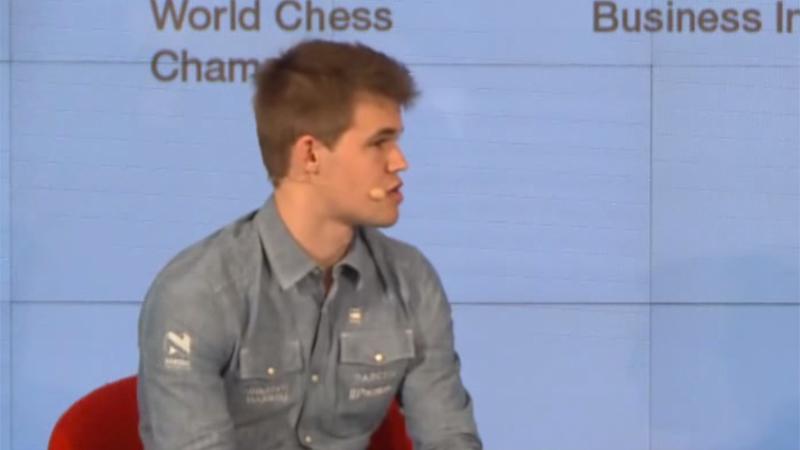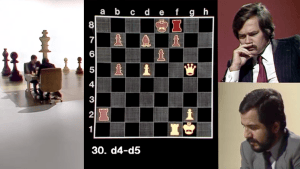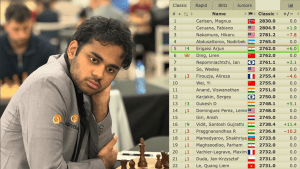
Magnus Carlsen: “I appreciate creating something unique”
Last month GM Magnus Carlsen visited New York. Besides his blindfold simul at the Sohn Conference, he also joined the DLD Conference in New York, where he was interviewed by Nicholas Carlson of Business Insider.
The Digital-Life-Design (DLD) Conference describes itself as “connecting industry leaders, startups and creatives from Europe, Israel and the U.S. for crossover conversation on business, digital culture and innovation.” One of the guests was the world champion of chess.
Interviewed on May 6th by Nicholas Carlson, Chief Correspondent for Business Insider, Carlsen speaks about how computers think, how he thinks, why he loves the middlegame, about creativity, about his evolving playing style, his PlayMagnus app and more.
The full interview was posted on YouTube, and below you can watch it and/or read the full transcript below:
Thank you so much for doing this, I really appreciate it.
Thank you.
OK, so when I think about chess, and what I've always heard about chess is that it's about seeing the next move, and seeing the move after the move. Forgive the dumb question, but what does it like in your brain when you're playing a game? Are you seeing all the possibilities? Just describe it, what do you see when you look at the board?
When a computer looks at a position it will consider all the possibilities. It will see all the different possibilities and it will calculate them many, many moves ahead. For me, it’s more about seeing the right possibilities, finding the right ideas and evaluating them correctly. If I need to, I will be able to calculate the moves many moves ahead, but it’s really more about finding the right ones. And then, the board is always pictured in my head; there’s an image of the board moving the pieces around.
So, you see your move happening and then move happening, and then the next one and you can kind of feel it out. What is that feeling like, when you're processing what you want to do... Is it like a physical sensation, when you sort of know what move you want to make or... How does it feel like?
I think it’s partly subconscious, because sometimes there will be a decision-making process in my mind and then suddenly I make a move and I really don’t know why I did that. I really cannot sometimes sense the moment when I decide on that particular move, and at some point I just make it.

Part of the decision-making process happens subconsciously.
When you made the wrong move, how does that feel? How long does it usually take before you feel like you made the wrong one?
The strange thing is that, usually when I make a bad move I see immediately why that is a bad move, and that happens to many strong players. It’s really hard to say, maybe it’s because it’s a little bit easier to see the move that can happen when it’s actually on the board than just in your head. But it’s a fascinating problem.
There are people who love the opening game, the middlegame and the [end]game. The middlegame is your favorite part, at least that's what I've heard in the past. It's that the case, and why? Why is it that part?
I think... Well, there are different parts of the game. There is the opening, where a lot depends on analysis at home with computers and the computer is an incredibly powerful tool in chess and it’s a leveler of the playing field, so for me I feel that I have greater ability than the others so I try to analyze, try to choose openings that minimize the effect of computer analysis.
And then often in the endgames, if there are seven pieces or less, everything’s been worked out by the computer. So, if there are seven pieces or less total for each side then it’s all worked out and you can just go on to a website and check out what’s the right move in any position. So between that you have the middlegame, and there it comes down to pure chess ability and that’s why that’s my favorite part. [Smiles.]
So when there are seven pieces left, it's like oh, this is already written, I know what's going to happen.
It can be very difficult. Some positions, like if you have a rook and a knight against two knights, the computer might show you that White can win in 275 moves with correct play, and that is really too difficult for me or any other human. I’ve tried to play through the moves, tried to understand them, but it’s really hard to see the difference between the position that you have now and that you have fifty moves later on, and then fifty moves after that it’s again not much of a difference so that is beyond my comprehension. [Smiles.] But most of the time, yeah, with seven pieces or less the evaluation is known and it’s possible to figure it out, why.
Over the summer I actually wrote a book and I had to write a lot of words in a short period of time. I found that... I started to realize that my body was a machine and I needed to get a certain amount of sleep, I couldn't have a certain amount of drinking. I sort of needed to be able to tune my body the way to write better, so that I could get to a better word count. Chess is like a physical activity. You're at a board, it's a two-hour match. How do you train yourself as an athlete, to be ready for a chess match?
I think that... In general, I think being a bit tired or drunk or whatever, it shouldn’t be so bad for writing a book...
[Carlson laughs.]
...because I think when your brain is not... when you're not properly rested you can be as creative or more creative than when you’re properly rested. The problem is that the rate of errors goes up quite a bit, and that's what I felt... Once I played the World Blitz Championship and I had a bug so I was up all night, I couldn’t sleep at all, throwing up, feeling terribly. That day I played some of the most creative chess I’ve ever played, and I also made the worst blunders I’ve ever done.

More creative, but more errors after a bad night of sleep!
So I think for playing top level chess it is important to feel physically fit, because then you’ll be better concentrated and you will not make simple mistakes. It doesn’t matter how many good moves you make as long as you make one really bad one.
And what do you do to get to that frame of mind, when you are eliminating mistakes as best as possible in a physical sense?
It's always a balance, because I want to have a lot of energy but I also want to be calm. I don't know, it's hard. I'm still trying to find that balance but obviously to sleep well, to eat well during tournaments, that's a thing you must do.
I understand you're something of a sports fan, basketball, soccer... Do you see any sort of parallels between how those athletes go about their lives and you go about yours?
I think, especially during big events, it's very similar. You have your own little bubble that you live in. Everything is about eating, sleeping and preparing for the next game and getting some rest. I think it's what I do in training and tournaments, it's very similar to what athletes do.
The story out there is that your style has evolved over the years, from something more of a grinder style to more creative in recent years. Is that an accurate narrative that people have put out there. Tell me the story of how your style has evolved over the years.
Well, ever since I was little I've always liked to read about chess, to play through games of different styles and to be inspired by them, but I guess when I was younger, as most people are, I was more of an attacking player. After all, the game is about checkmating the king and as a less experienced player you want to reach that goal as quickly as possible. But as you face better opposition it becomes more difficult, they have better defensive techniques, and that’s why, after a while, I realized that I needed to play the endgames better and to be a bit more restrained perhaps, not to burn the bridges all the time. Recently again I’ve tried to be a bit more creative because you cannot always win games by superior technique. Sometimes you need to create something unique to baffle your opponents.
Would it be possible for you... you have catalogued all these games that other people have played, you remember your own games... are you able to describe the most exciting series of moves you have made in your career? The ones that were for you personally, maybe not even in a championship but at an early age, where you had a break through or had a big win... Even in the middlegames, when you set yourself up for a win?
I think the single most important tournament win for me was the Norwegian Championship under 11 in 2000. [Smiles.] That was a big deal for me.
As for games, I don’t know. What used to be perhaps my favorite game was my game with then-World Champion Anand from 2010, because in that game I felt like I created something out of nothing and it gave me a great deal of creative satisfaction – even though I didn’t actually win the game.
I guess it’s always a bit different what I appreciate in my own games and other people’s game than what most people appreciate, because most people want to see mating attacks on the king.
What do you appreciate?
I appreciate creating something unique, and that can be some kind of attack but... just an idea, something I haven’t seen before. That is what fascinates me.

Creating something unique is what fascinates Carlsen.
You once said that computers have made the game less dogmatic. What did you mean by that?
It means that moves that look bad or unaesthetic are considered by the top players, while previously people would kind of shy away from those kind of ugly moves. But now the thing is that because of the computers, because of the computer’s brute calculation people are more and more starting to see every position as a... they have to see them concretely. Because you cannot rely on what has been taught in books, like ‘this is good, this is bad.’ There are always exceptions and every situation is different, and even if something looks bad, it doesn’t look right, you calculate it, it works and there you go.
It's fascinating that a computer sort of helps foster creativity, even though it's the thing that's programmed, it's sort of forcing into creativity in a sense.
Yeah. It’s just forcing us to look a bit further, to look away from what the books used to teach us. It’s forcing us to break the rules.
Is that why PlayMagnus, your app, the sense of this... How can the sense of the computer help people to be more creative? How does this work into this product that you're helping usher into the world and why is this important to you? You don't have to be doing this kind of thing? You can just play chess and be famous.
For me it’s interesting to see the play of PlayMagnus at different ages because sometimes it is modeled after my playing style and strength of those different ages. I played, I tested myself against Magnus 12 at some point. It was kind of strange because I thought, this is not right, I mean, Magnus 12 is only going for king attacks and he has no technique, it’s all tactics. That’s not right, that’s not how I played at that age. And then I decided to play through quite a bit of my games from that age and I realized it was right!
[Carlson laughs.]
But I think it's a great tool and it's something for people to strive after. It's interesting to people to play against the computer; you beat the computer at one level, then you advance to the next. But if you're actually playing a human opponent, it's much more interesting to advance to the next age and once you get to a certain age it's really good. If you beat Magnus for instance at ten years old, you've done really well because not a lot of people are able to...
[Carlson laughs.]
...not a lot of people were able to beat me at that age.
Do you like this? Do you like being world champion, and this famous? You're in photo shoots with models and things like that. Is it what you wanted out of this? You're 24 years old and you're the best.
Well, I like being world champion, that’s for sure!
What about world famous world champion?
Well, fame has not really been a goal for me. I’m very happy and very privileged that I can earn a good living from playing chess and I want to bring the “happy message” of chess to the world, because wherever I travel I see a lot of kids playing chess, both at chess clubs and at schools, and it brings them so much joy. That is why I want more people to play the game, but for me personally fame and all that comes with it is not a goal.
Thank you so much for doing this, I really appreciate it. It's been a lot of fun.
Thank you.


